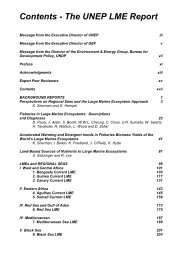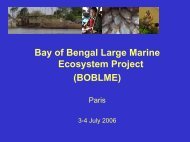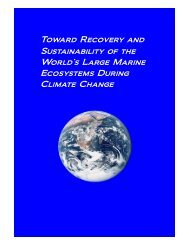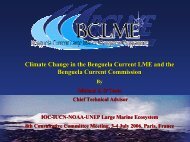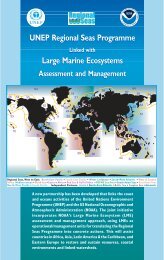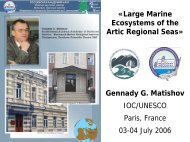Sustaining the World's Large Marine Ecosystems
Sustaining the World's Large Marine Ecosystems
Sustaining the World's Large Marine Ecosystems
Create successful ePaper yourself
Turn your PDF publications into a flip-book with our unique Google optimized e-Paper software.
Indicators of Changing States of<br />
<strong>Large</strong> <strong>Marine</strong> <strong>Ecosystems</strong><br />
Kenneth Sherman*, Igor Belkin**, Sybil Seitzinger***, Porter Hoagland ****,<br />
Di Jin****, Marie-Christine Aquarone*, and Sally Adams*<br />
The <strong>Large</strong> <strong>Marine</strong> Ecosystem Approach<br />
A global movement that applies an ecosystem based management (EBM)<br />
approach to recover marine goods and services is presently being practiced in a<br />
growing number of developing countries. It is known as <strong>the</strong> <strong>Large</strong> <strong>Marine</strong><br />
Ecosystem (LME) approach, and it is being endorsed and supported by<br />
governments world-wide, as well as by financial institutions including <strong>the</strong> Global<br />
Environment Facility, <strong>the</strong> World Bank and by a broad constituency in <strong>the</strong> scientific<br />
community.<br />
While we concur with <strong>the</strong> movement toward an ecosystem-based approach to <strong>the</strong><br />
management of marine fisheries (Pikitch et al. 2004), it is important to recognize<br />
that a broader, place-based approach to marine ecosystem assessment and<br />
management, focused on clearly delineated ecosystem units, is needed. In<br />
2005, <strong>Large</strong> <strong>Marine</strong> <strong>Ecosystems</strong> were recognized in a scientific consensus<br />
statement by over 200 marine scientists, academics and policy experts as<br />
important global areas for practicing ecosystem-based research, assessment and<br />
management of ocean goods and services (McLeod et al. 2005). A movement is<br />
presently under way to assess and manage a growing number of <strong>the</strong> world’s<br />
LMEs, with <strong>the</strong> support of financial grants, and donor and UN partnerships, in<br />
nations of Africa, Asia, Latin America and eastern Europe. It is within <strong>the</strong><br />
boundaries of 64 LMEs (Figure 1), that 80% of mean annual marine fisheries<br />
yields is produced, overfishing is most severe, marine pollution is concentrated,<br />
and eutrophication and anoxia are increasing.<br />
*National <strong>Marine</strong> Fisheries Service, Narragansett, RI 02882, USA<br />
** Graduate School of Oceanography, University of Rhode Island, Narragansett, RI USA<br />
***IGBP Secretariat, The Royal Swedish Academy of Sciences, Sweden<br />
****<strong>Marine</strong> Policy Center, Woods Hole Oceanographic Institution (WHOI), Woods Hole, MA<br />
13



